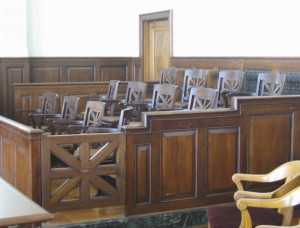Stephen L. Winter is a law professor at Wayne State University School of Law I've followed his excellent writings for many years. I recently read one of his more recent articles, "John Roberts Formalist Nightmare," alleged in the January, 2009 edition of the University of Miami Law Review (63 U. Miami L Review 2009) (not available online).
To set the stage for his brutal critique of Supreme Court Chief Justice John Roberts, Winter considers four approaches to the meaning of "formalism." In the first approach,
The term "formalist" is an epithet to describe a judicial decision that ascribes away responsibility (as in, "It's not me, it's my job . . . or the law, or the text, etc."). Hence, formalism is the frequent refuge of socially and politically conservative judges when faced with the claims of reform movements.
The second approach is closely related to the first. It refers to "mechanical jurisprudence." The basic idea is that "general doctrines can be applied deductively to decide specific cases, thereby assuring the objectivity and neutrality of judicial decision-making." Under this approach, the reasoning process is "supposed to be guided solely by the formal entailment of the concept. Under this second approach, a judge will insist that a concept (e.g., "freedom of contract")
fully determines the outcome of a particular dispute, irrespective of the broader social ramifications.
The third approach connotes "hypertechnicality in judicial decision-making." Winter points to two recent decisions by Chief Justice Roberts in which the United States Supreme Court rigidly applied legal deadlines "notwithstanding the presence of strong equable claims and long recognized exceptions." One of those cases was
Ledbetter versus Goodyear Tire & Rubber Co., a decision so palpably unfair in its anal-retentive application of a narrow statute limitations that Congress promptly got to work on the issue and recently overruled it. See
here and
here. As Winter points out,
Ledbetter is a great example of the many instances in which "hypertechnicality and conceptualism often work hand-in-hand to provide a cover of necessity for willfully reactionary decisions."
There is also a
fourth sense of formalism. In this fourth approach to formalistic reasoning, concepts are treated as meaningful "entirely abstracted from their contexts. Winter gives the example of
Plessy vs. Ferguson, in which the Supreme Court presented its solution to the case as one of "formal equality," presuming the absolute equality of the races before the law, bringing to mind Anatole France's famous quote that "The law in all its majesty forbids the rich and poor alike to sleep under bridges, to beg in the streets, and this deal their bread." Winter laments that thanks to its ability to frame individuals in abstract ways, far from their real-life social contacts, this sense of formalism allows a court to simultaneously express regret for an outcome yet fiercely perpetuate it through conscious and narrowly tailored decision-making.
What do each of these senses of formalism haven't common? Each of these approaches allows decision-makers to
give every appearance of deciding the case according to law without ever acknowledging that the law they are "following" is in actuality a product of their own interpretive acts. . . . Formalist legal reasoning engages the decision-maker in a performance of impersonal decision by appealing to authority. It disclaims the personal responsibility of the decision-maker and, though us, frustrates accountability. . . It operates in abstraction from the social prerequisites and consequences of law. In all these ways, formalism is anything but democratic . . . it is a distorting methodology that weighs on the law like a nightmare more reminiscent of the injustices of the 19th century than of a modern society that professes to value equal justice under law.
Stephen Winter's analysis of formalism can be extended far beyond exercises in jurisprudence. It can be extended to all instances wherein someone wielding political power makes an argument or a decision by focusing tightly on a principle detached from the social context that gives that principle its legitimacy.
Winter's article is also well worth reading for anyone who wants to see substantial evidence that the Chief Justice of the Supreme Court of United States is quite capable of a substantial misreading of one of the most important cases ever decided,
Brown v Board of Education. For instance, Justice John Roberts claims that
Brown determined the outcome of
Parents Involved in Cmty. Sch. v. Seattle Sch. Dist. No. 1, 127 S. Ct. 2738 (2007) in that Brown purportedly prohibited government classification and separation, whereas the boundary plan adopted by the Seattle and Louisville school boards did not "separate" students at all. These were plans that were adopted for the purpose of providing a
remedy for racial isolation. Winter points out several other major distortions Roberts gives to Brown. Winter also establishes Roberts' hypocrisy in criticizing a fellow justice (Justice Stephen Breyer) for relying on dicta when Roberts himself strays even further from relying on the holdings of precedent when he relied upon statements contained in appellate briefs, statements not included in Supreme Court opinions at all.

